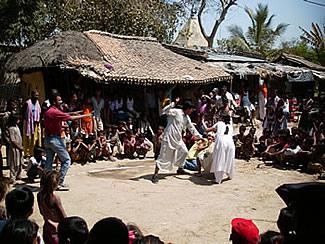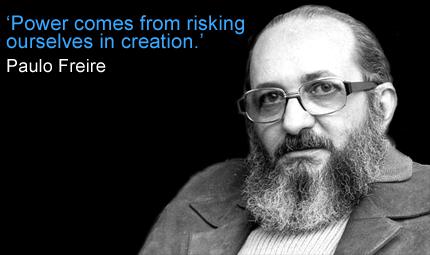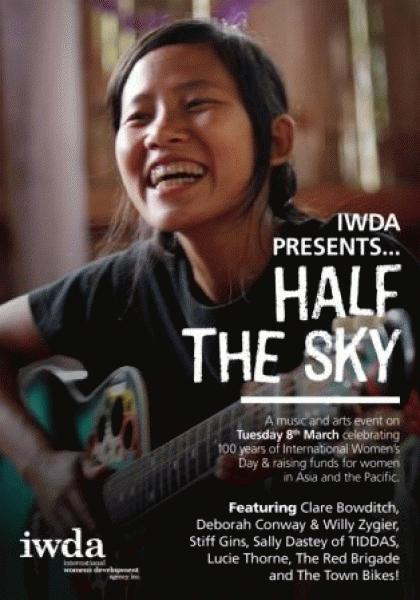 Theatre for development in practice
Theatre for development in practiceRather than being simply a method of communicating health and educational messages to communities, theatre for development aims to create a forum for people to negotiate their own change. The pedagogical theories of Paulo Friere (2002; 2006a; 2006b) offer a framework for working with communities and have been instrumental in developing concepts of theatre for development. Friere initiates a ‘bottom-up’ approach to education, in which students institute their own solutions to problems. In his most famous text, Pedagogy of the Oppressed (2006a), Friere separates his work from what he calls the ‘banking’ method of education. The banking method refers to the assumption that students are an empty vessel and the teacher’s ‘task is to ‘fill’ the students’ with knowledge (Friere, 2006a, p. 71). The student is filled up like a bank, a receptacle to be sustained by the teacher. The teacher tells, while the student listens, records, remembers. Knowledge can be possessed or lacking, with the teacher acting as regulator, or depositor of essential information. Meanings are delivered as if they are absolute and unchanging: ‘The teacher talks about reality as if it were motionless, static, compartmentalized, and predictable’ (Friere, 2006a, p. 71). According to Friere, this banking method reflects an oppressive society which clearly delineates ignorance from knowledge, and denies any attempt to transform existing power structures. Knowledge is given value according to who holds it, so that wisdom held by students is not as valuable as that held by teachers. It is the ‘teacher [who] chooses the program content, and the students (who were not consulted) adapt to it’ (Friere, 2006a, p. 73).
 Paolo Freire and freedom through education
Paolo Freire and freedom through educationThis banking method of education annuls possibilities for transformation and creativity. It is the same framework that delivers communities ‘’folk’ songs, dances, poems and stories that have already been planned for them’ (Chinyowa, 2008a, p. 18). It presumes that ‘the individual is a spectator, not re-creator’ of the world (Friere, 2006a, p. 75). Instead of simply delivering knowledge, Friere suggests education as the posing of problems, a dialogue between equals in which all are responsible for intellectual and personal growth. Friere’s philosophy engages learners in dialogue that invites them to be become ‘co-investigators’ in building awareness (Friere, 2006a, p. 106). Learning expands into a process of conscientizacao, or a developing of awareness and taking action against of one’s oppressions (Friere, 2006a). In the spirit of Friere’s theories, when considering theatre for development Kennedy Chinyowa (2001; 2007; 2008a; 2008b) writes that the process assumes ‘people are capable of transforming themselves if they are afforded the space to participate in their own development’ (Chinyowa, 2008a, p. 5). Theatre for development is influenced by a Frierean framework and aims to become ‘the action and reflection of men and women upon their world in order to transform it’ (Friere, 2006a, p. 79). Performance is participatory, awakening people from a passive state of acceptance, into a critical consideration of their realities.

Despite the impact of Friere’s participatory framework upon theories and practices of theatre for development, performance processes may continue to silence women participants. While women may be visible in theatre for development shows, performance theorist Esi Dogbe (2002) argues that they do not necessarily have a voice in the process. In her analysis of theatre for development in Ghana, Dogbe writes that plays may deliver messages of women’s strength and decision-making abilities, yet these same performances do not allow women to become active decision makers in the play-making process. While Ghanaian policies on development aim for the empowerment of women, none of the projects that Dogbe studied explicitly attempted to challenge gender frameworks. Instead, performances target women ‘with messages to work harder, keep their surroundings clean, develop eco-consciousness, and discipline their sexual behaviour’ (Dogbe, 2002, p. 88). As Dogbe puts it, women are ‘simultaneously ‘vocal’ and ‘silenced’, ‘visible’ and invisible’’ in a contradictory approach to participation (Dogbe, 2002, p. 85).
While participation is a key tenant of theatre for development, without a critique of gendered practices, theatre for development cannot offer alternative ways for women to participate. Chinyowa maintains that while ‘community theatre remains in search of social change, it seems to be confronted by ambiguities in terms of the agency, power and representation of its participants’ (Chinyowa, 2008b, p. 11). According to Chinyowa, those working in the field of theatre for development, who are often outsiders to the communities with which they work, can fail to fully observe and understand the cultural norms of target communities. He examines how notions of participation involve more than simply performing plays in local languages, and post-performance discussions (Chinyowa, 2008a). Both Dogbe and Chinyowa warn of the potential of shaping theatre for development projects to suit stakeholder needs, rather than taking into account the specificities of each community. If performance is to prevent the script of rape then it must take as a starting point communities’ own attitudes and configurations of gender and relationships, inviting participants to consider and critique the social implications of these.
